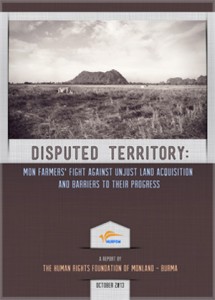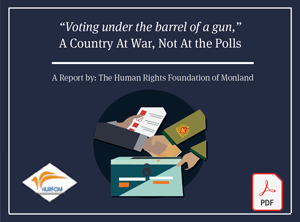HURFOM releases “Disputed Territory” to highlight unjust land acquisition in Mon areas
October 9, 2013
The Human Rights Foundation of Monland (HURFOM) has released a report titled “Disputed Territory: Mon farmers’ fight against unjust land acquisition and barriers to their progress,” to illustrate contemporary struggles against past and on-going land disputes. Drawing from almost 100 interviews conducted in Ye, Yebyu, and Kyaikmayaw townships, the report presents cases of land confiscation and abuse in Mon areas and elevates the voices of farmers who are actively pursuing justice.
 “Based on the findings from our field research, we can say that several problems and obstacles exist for local farmers who want to reclaim their lands,” said Nai Aue Mon, HURFOM’s documentation coordinator. “It is quite disappointing to see that the current civilian government seems unable to resolve both past land abuses by the former military government and new land conflicts perpetrated by companies in the Kyaikmayaw area of Mon State. New legislation passed in 2012 cannot guarantee farmers’ rights to land when they face unjust land acquisition or prevent future injustice regarding land issues.”
“Based on the findings from our field research, we can say that several problems and obstacles exist for local farmers who want to reclaim their lands,” said Nai Aue Mon, HURFOM’s documentation coordinator. “It is quite disappointing to see that the current civilian government seems unable to resolve both past land abuses by the former military government and new land conflicts perpetrated by companies in the Kyaikmayaw area of Mon State. New legislation passed in 2012 cannot guarantee farmers’ rights to land when they face unjust land acquisition or prevent future injustice regarding land issues.”
The report primarily utilizes two case studies – farmers’ appeals against past military land confiscations in Ye Township and on-going misconduct by various investors in Kyaikmayaw Township – to analyze the legal and communal challenges inherent in Mon land disputes. According to the report, few victims of unjust land acquisition have had land returned, private investment continues to exploit farming families, and secure land rights remain largely absent from Burmese law.
“I want to provide a livelihood for my family,” said one of the report’s interviewees. “So when my plantation was confiscated I was like a person with broken legs.”
HURFOM contends in the report that farmers’ increasing willingness to demand justice and express concerns about land abuse presents an important opportunity for President Thein Sein’s administration. Substantive government action that ensures independent and impartial dispute resolution, implements mechanisms to provide fair compensation or land return, and amends the country’s laws to protect farmers’ customary land rights would signal a clear break from previous policies and genuinely initiate democratic reform.
Data collection undertaken to verify and report on cases in Ye Township also revealed the difficulties encountered when investigating former confiscations. Reporters described that, in some villages, accurately tracking decades of land ownership was problematic due to sale, rental or re-confiscation of land that may have occurred since the original acquisition took place. Similarly, land acreage and the number of agricultural assets (trees or plants) involved at the time of confiscation proved difficult to confirm due to falsified military records, insufficient land documentation, inflated claims by victims, and human error when remembering exact circumstances. However, HURFOM calls on all relevant persons in positions of authority to undertake these endeavors to change the course of Burma’s history of land abuse and stand behind farmers that have crafted the country’s social and economic landscape for generations.
The Human Rights Foundation of Monland (HURFOM) was founded in 1995 by a group of young Mon people aiming to seek truth and justice for a peaceful democratic transition in Mon State in Burma. Since 2004, the Human Rights Foundation of Monland – Burma (HURFOM) has been one of the key member organizations of the Network for Human Rights Documentation – Burma. ND-Burma was formed in 2004 and is a multi-ethnic network providing a mechanism for Burma’s human rights organizations to collaborate on the human rights documentation process.
For more information, please contact: Nai Aue Mon, Coordinator of the Human Rights Documentation and Dissemination Program, Human Rights Foundation of Monland – Burma (HURFOM).
Email: auemon@gmail.com, monh
Full PDF copies of the report can be downloaded at:
http://rehmonnya.org/reports/DisputedTerritory.pdf.
Report-in-Brief (Burmese)
http://rehmonnya.org/reports/Brief-in-Burmese.pdf
Hard copies of the report can be obtained by emailing monhumanrights@gmail.
Comments
Got something to say?
You must be logged in to post a comment.




















































